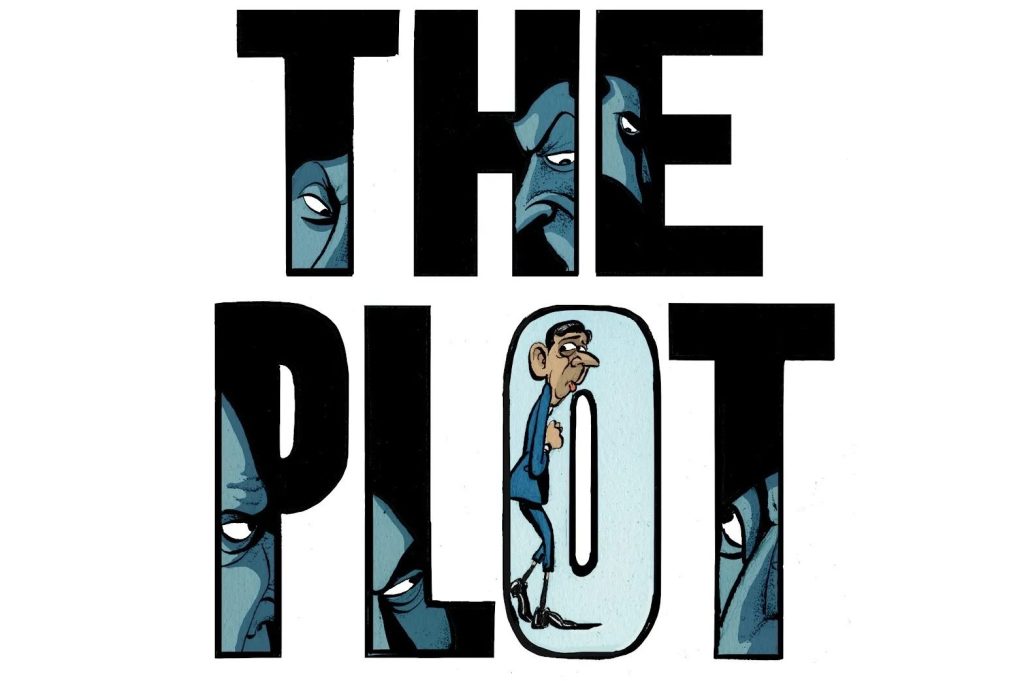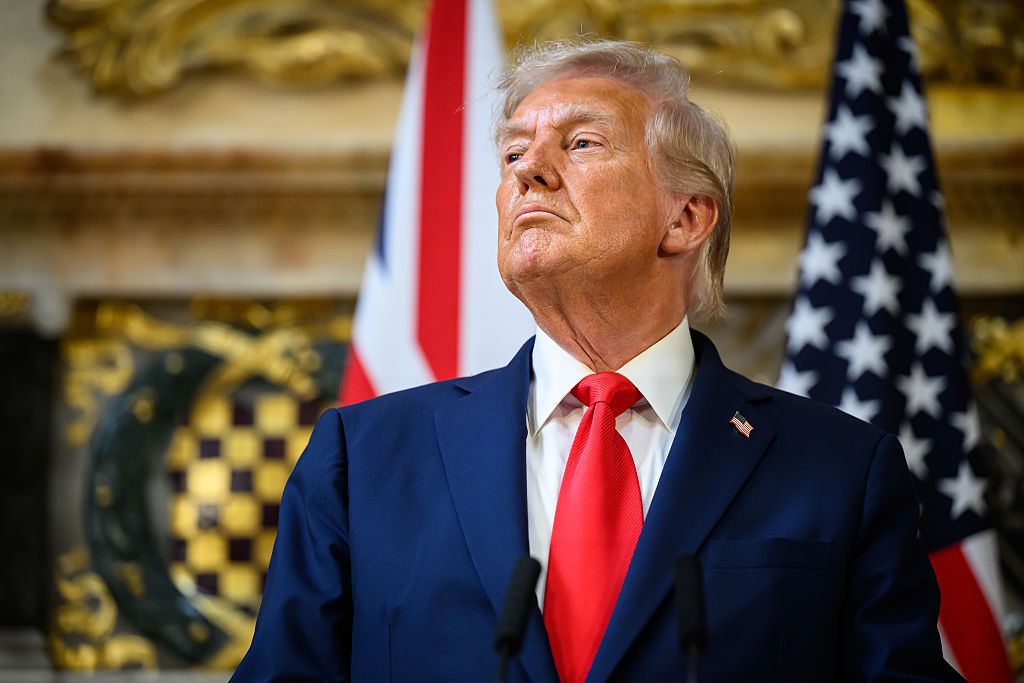Westminster and its drinking holes have always been a fertile ground for conspirators. There was the dead sheep coup against Margaret Thatcher, the curry house conspiracy against Tony Blair, the great goose plot against Gordon Brown and the pork pie putsch to oust Boris Johnson.
Now that Rishi Sunak has the worst approval ratings of any prime minister in an election year, it’s inevitable he should be the target of a new plot. The Tories have become the party of regicide. The dispatching of Liz Truss was carried out with record-breaking speed. When things get bad, the Tories change leader. It’s the party’s natural reflex.
‘If you are working on a plot, you don’t go around telling everyone. That’s plotting 101’
For many, the idea of removing Sunak is mad. An election is just months away, Labour is twenty points ahead in the polls and its main attack line is that the Tories are a feuding rabble. The one Member of Parliament this year to call for Sunak to go — the Truss loyalist Simon Clarke — has been ostracized by his colleagues. “He has united the party in dislike of him,” says a former cabinet minister. But his logic — that a party heading for oblivion has to change course — has resonated with some members, former government aides and disillusioned donors. Today’s polls point to a Conservative wipeout and a 250-seat majority for Labour. So they ask: what is there to lose?
A cabal has formed with the intent of replacing Sunak with a leader who can move the party on to a more secure footing on immigration. “We are not one homogenous group. There are various people who think Rishi isn’t working. Inevitably, conversations are taking place,” I’m told by one figure who is advocating for change. “The thing to understand is that it’s a lot more organic than some make out.”
Instead of meeting at a bar or a curry house, as is traditional for Westminster conspiracies, the plotters have been working from an office in the West End. There are “desks and sockets,” says one plotter wryly of the professionalism on display. There’s also money. “The movement is attracting funds, even if a lot of the people approached think it’s mad,” says one Conservative figure.
The mysterious Conservative Britain Alliance — a group of anonymous donors — has already spent tens of thousands on polling that is aimed at portraying Sunak as an electoral liability. The Tory peer Robert Hayward compared a damning YouGov poll that was paid for by an unnamed sponsor to machinations in Zimbabwe. He accused the plotters of having “fat wallets” but of not being “democrats.” “The government say they’re not bothered by us, but it’s week four and one of their outriders is comparing us to Zimbabwe,” says one figure involved with the rebel Alliance.
In 10 Downing Street, the plot planning is being watched with alarm. One theory is that Brexiteer donors who never took to Sunak are uniting. Government loyalists are trying to find out if there is any link to Nigel Farage. They are on the hunt for “useful idiots” in Conservative ranks. Some close to Sunak believe all roads must lead back to Reform, as even the most disloyal Tory should recognize the madness of rocking the boat during such a storm.
A group of former government aides (some on very comfortable pay) are working on what one previously described as a “grid of shit” of announcements to dent Sunak. Will Dry, the prime minister’s former pollster who quit last November and who recently warned that the party is “heading for the most almighty of defeats,” has joined the conspirators.
Then there’s Dougie Smith, a longstanding shadowy power-broker in the party who once called Johnson to say: “I’ll finish you off.” Last year Nadine Dorries used her book, The Plot, to accuse Smith of being the figure who decides when Conservative leaders fall, predicting he would try to oust Sunak to make way for Kemi Badenoch, the business secretary. At the time, Members of Parliament laughed off her claims. Now they think she may have had a point. “The plotters are starting to make Nadine sound sane,” says a despairing Tory member.
The plotters view the 100 days between now and the fallout from the local elections in May as the period they have to convince members it’s time for one last roll of the dice. “It needs to be done in the fortnight after the locals,” says one figure involved. “You couldn’t change leader much later than May.” Some trying to push out Sunak say privately that if there is no movement in May, they will give up and move on so as not to cause problems closer to the election.
To many watching, the whole thing looks very amateurish. “If you are working on a plot, you don’t go around telling everyone,” ventures a Conservative insider. “That’s plotting 101.” Some former party strategists have been approached and said no. Tory members — including many Trussites — are making it known they aren’t on board with the plan. But the plotters think time could change that.
The movement began as a discussion on policy as rebels met to discuss how to force the government to take a tougher line on the Rwanda legislation. However, when Sunak refused to budge and chose to face down the rebels, the conversation quickly moved on to a change of leader. This group argued that the prime minister has abandoned the idea of keeping Red Wall and Leave voters (who would be needed for the Tories to win) onside and instead is retreating to a Cameron–era comfort zone: a decision encapsulated by the sacking of Suella Braverman and the return of David Cameron to government.
The issue that most matters to Leave voters is illegal migration and fewer than a quarter trust Sunak on it. “Voters aren’t idiots, they can tell his heart’s not in it,” says one rebel. “Rishi has steered us to a form of anodyne conservatism,” complains one former minister. When he took over, the Tories were polling at 27 percent, which was then seen as a rock-bottom figure. Now it’s 24 percent.
“No one thinks we can win,” says one plotter. “But we could lose less badly.” The Tory hope is for a quick recovery — just one term in opposition. The fear, as Dry puts it, is that “the Conservative Party essentially won’t exist by Christmas.”
The plotters have some ideas for what A.N. Other new leader should do in his or her first week: harden the boats bill; cave to junior doctors to end the strikes; go harder on sentencing. For some, a line in a conference speech from the former home secretary Suella Braverman — “A Britain that puts you first” — sticks out as a slogan for a more populist front. But there is nothing yet that adds up to a firm agenda.
The next hurdle for the government will be the by-elections in Wellingborough and Kingswood. “It could be our worst week yet. If we’re unlucky, next week could see inflation rise on Wednesday, a recession named on Thursday and two by-elections lost by Friday,” says an insider. The Tories argue that any party would struggle to do well in the circumstances. But if the Reform Party has a good showing, we can expect more talk of the need for a “change in strategy” to stop more voters switching to right-leaning parties at the general election.
The local elections in May are going to be painful for the Tories. Some rebels argue that Sunak could be convinced to stand down if the results are a bloodbath. A swift leadership election could follow, lasting not more than a week. But: who? “Anyone would be better,” says one rebel. “He is the worst prime minister ever.”
Can you have a rebellion without an obvious candidate? The ones heading the plot think that if a vacancy were created, leadership hopefuls would emerge. It’s not gone unnoticed that the two frontrunners to eventually succeed Sunak are doing plenty of parliamentary outreach. Penny Mordaunt holds regular meetings with members as part of her role as leader of the house. Meanwhile, a handful of members have been invited to drinks hosted by Badenoch on the first Monday after the February recess. “It’s to ‘selected colleagues,’” says one invitee. “That’s probably code for ‘members who will survive the election.’” On current trends, two-thirds of the Tories may not.
Can you have a rebellion without a candidate? The plotters think leadership hopefuls would emerge
Robert Jenrick, once Sunak’s best friend in politics, resigned as immigration minister in protest at what he regards as a weak Rwanda bill. He is now seeking to steer the argument about the future of the party. He is heading to the US next week, visiting the southern border as the guest of the governor of Texas to see what lessons can be learned about tackling illegal migration. There is also a plan for Jenrick and Neil O’Brien (a Badenoch ally) to team up to publish their own manifesto on what the Tories must do about legal migration.
The standard procedure for dealing with political insurgency is to flush out everyone involved, hoping it’s harder for them to cause trouble when they’re in plain sight. The fact that so far the plotters don’t have the numbers, a plan or a replacement candidate is only a mild consolation given that it is clear their intent is to cause the prime minister as many problems as possible. “It’s pointless violence but it is still violence,” complains one Sunak ally.
The message the government wants to send to members isn’t so much that the prime minister is an asset who must be protected — it’s that infighting is fatal. “We would not go quietly,” warns a senior government figure. That was the takeaway at last week’s dinner for Tory members held at a swanky London hotel. All 349 members were invited and just over half showed up. The pollster Isaac Levido repeated his warning that divided parties fail. “It was a good atmosphere, but No. 10 should worry that almost half of [members] didn’t attend,’ says one member. The LBC presenter Nick Ferrari, who was a special guest, passed on to attendees the message he said he had received from the thousands of listeners he had spoken to: voters are sick of the psychodrama. Yet with 100 days to go until the local elections, there will be plenty more to come.
This article was originally published in The Spectator’s UK magazine. Subscribe to the World edition here.


























Leave a Reply